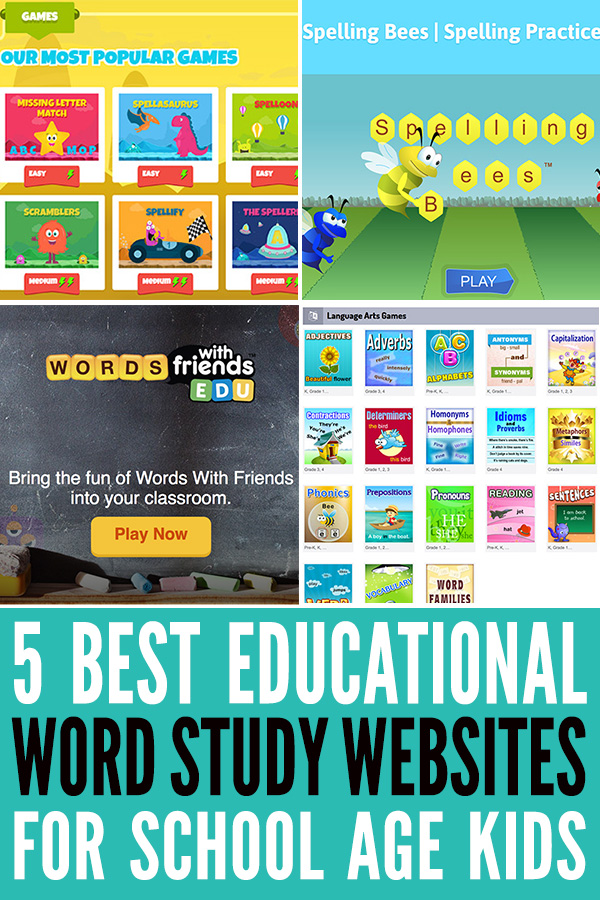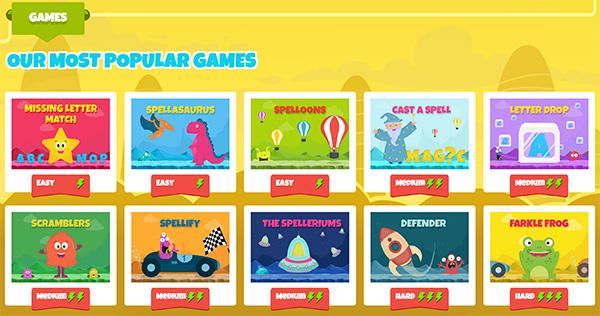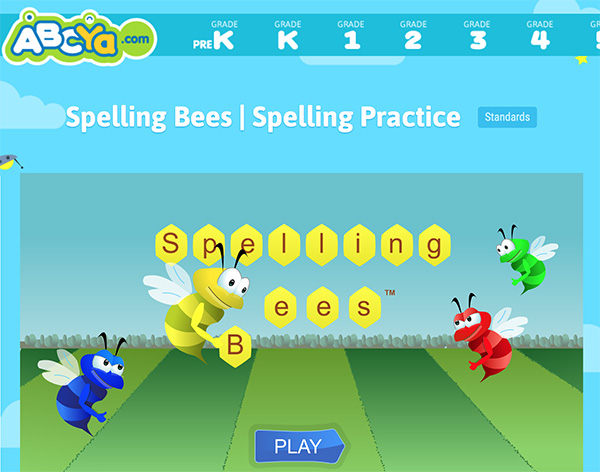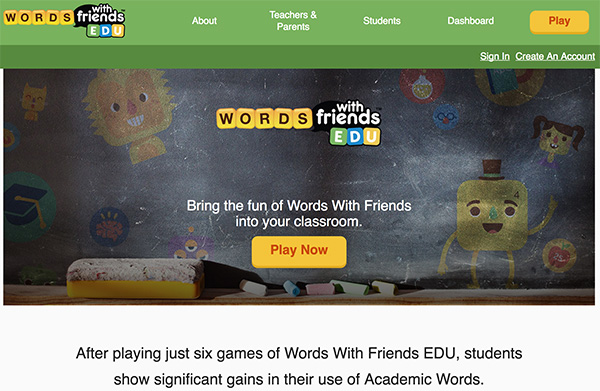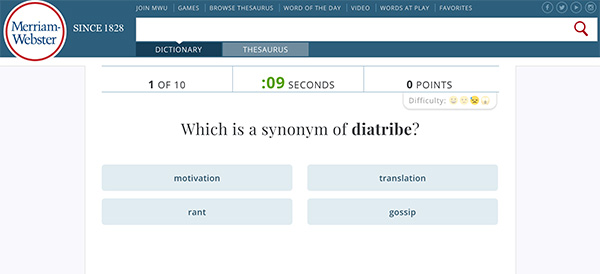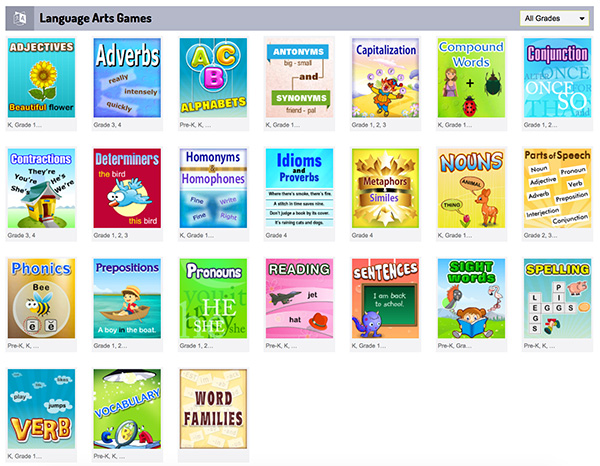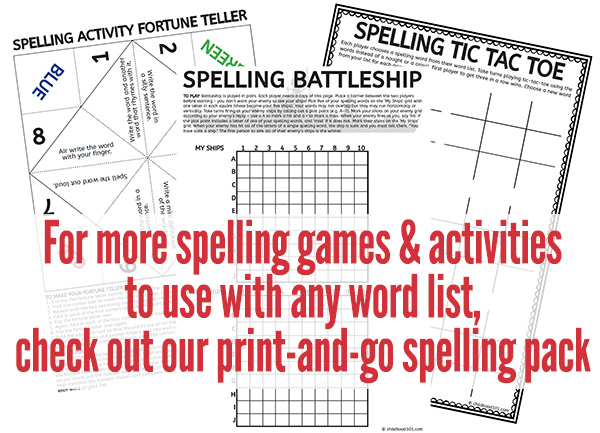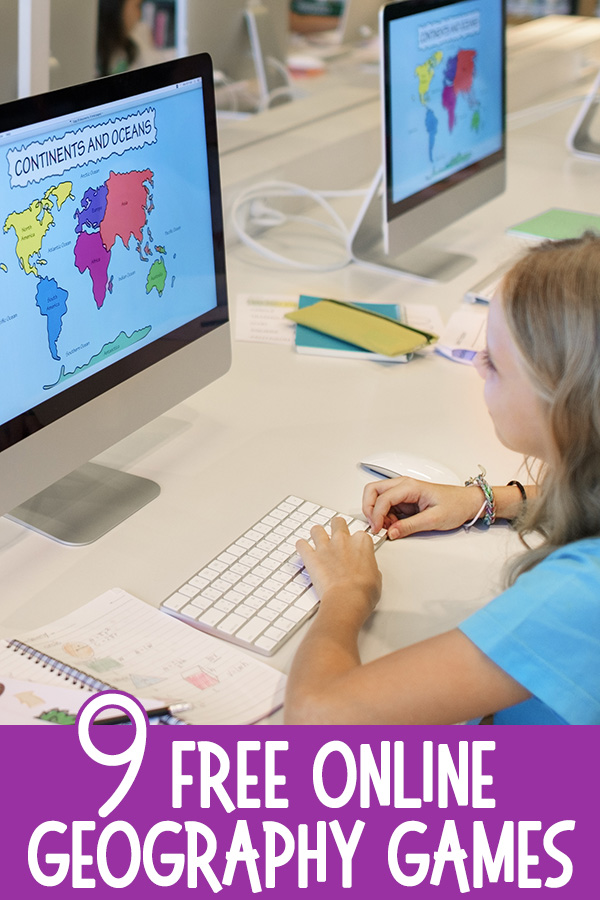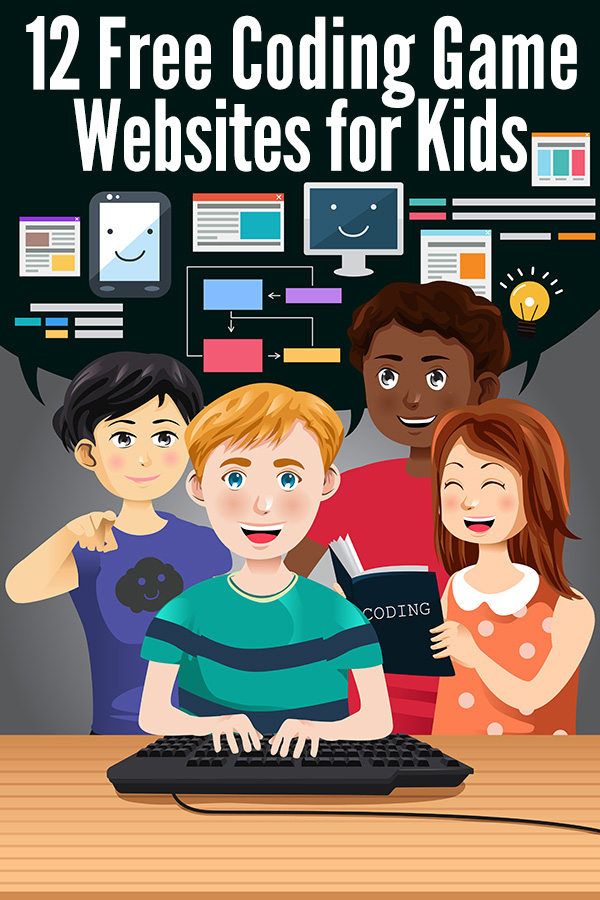
Image: Shutterstock
One of the most effective ways for young children to gain knowledge and develop crucial abilities is through play. So, if you’re in search of some fun and educational activities to do at home, word games for kids are the perfect option to keep your little one engaged. This game also makes learning at home enjoyable and lays the foundation for successful school learning. Moreover, word games assist your kid improve their vocabulary, spelling, grammar, writing, reading, verbal, and communication skills. Parents can study alongside their kids as children like having their parents participate in their learning. In this post, we present you with a list of fantastic word games that kids and adults may enjoy together. Read on.
Benefits Of Word Games
If you are wondering why word games for children are beneficial, here are some reasons:
- Develops vocabulary
- Improves fluency in the language
- Hones comprehension and reasoning skills
- Develops a love of words and reading
- Sparks their imagination and memory
- Improves their problem-solving skills
- Encourages creativity
- Serves as a great pastime for the family
- Stimulates the brain
- Improves concentration
There are many word games for kids that help them learn new words. These games are entertaining and educational, making them enjoyable for everyone involved.
We have listed the 20 best word games for kids. These games will ensure you and your children have a great time learning new words.
1. Hangman

Image: Shutterstock
Hangman is a fun paper and pencil guessing word game for kids that can be played between two players. More players can participate and take turns as well. It is a simple game where a stickman is hanged if a player fails to get the word right.
Age group: 6 to 10 years
No of players: 2
How to play:
- Take a sheet of paper and a pen and draw gallows.
- The first player thinks of a word and draws dashes above the gallows equal to the number of letters in the word.
- The other player starts guessing the letters one by one.
- If the letter the player says is in the word, the first player writes it in the corresponding spaces on the dashes.
- If the letter is not in the word, the first player draws one part of the stickman, starting from the head and followed by the body, hands, and legs.
- If the stickman gets completed before the second player guesses the word, that player loses.
- Switch sides and start again.
- Proper nouns or slang words are not allowed.
2. Name the animal
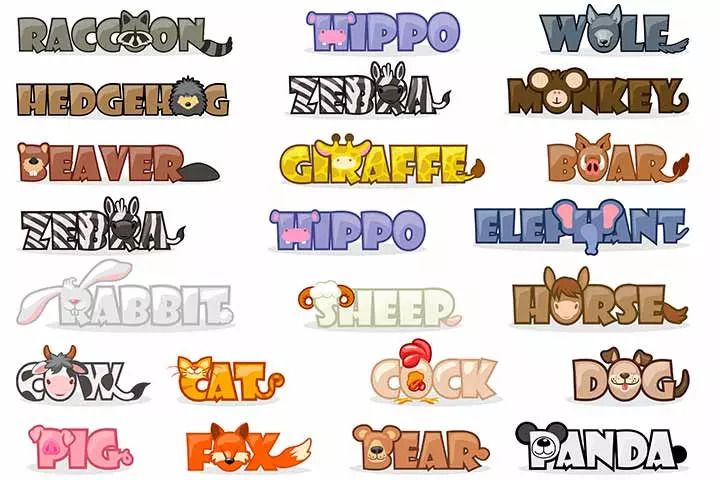
Image: Shutterstock
Name the animal is a multiplayer kids word game that can help teach your children animal names and improve their reasoning skills. This game also offers your child the opportunity to exercise their lateral thinking skills.
Age group: 4 to 7 years
No of players: 2 or more
How to play:
- You can be the host of the game.
- Make a list of common animals and a list of words that rhyme with these animal names.
- Call out each player and present them a rhyming word, and let them guess the animal name. You can say things like, “I rhyme with fog. I am a …..”
- The player who gets the maximum words correct is the winner.
- You can also teach them animal sounds by substituting animal names with their sounds.
3. I spy

Image: Shutterstock
I spy is one of the easiest games of the lot. All you need is your imagination and some eager players.
Age group: 4 to 6 years
No of players: 2 or more
How to play:
- Locate an object, and tell your child its first letter saying, “I Spy an object starting with the letter ….”
- Your child looks around and recognizes each object corresponding to that letter.
- Stop when they get it right and continue the game with the next player.
- You can also mention the color or shape of the object and let your child guess it correctly.
4. Make a word
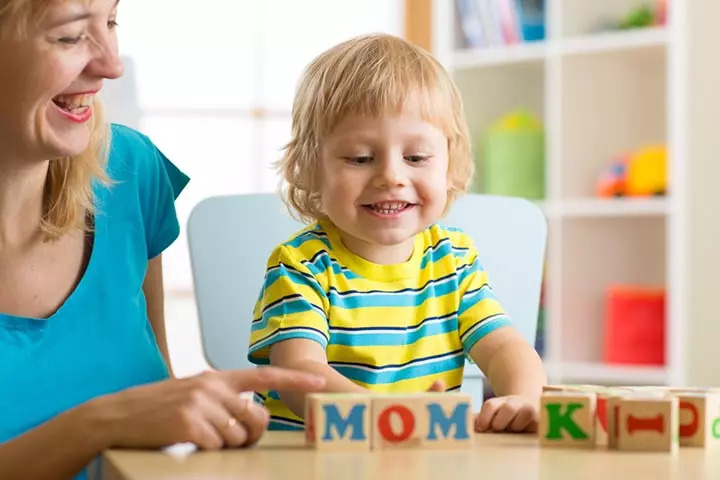
Image: Shutterstock
If your child is starting to learn new words, this word game for kids is useful. You can also play this game with older kids to make them learn difficult words and improve their memory. This game lays a solid foundation for playing advanced spelling games, such as Scrabble.
Age group: 4 to 12 years
No of players: 2 or more
How to play:
- You can play this game with younger children if you have magnetic letters, plastic letters, letter mats, or letter blocks.
- Give them a set of letters and ask them to make two- or three-letter words with them.
- For older children, you can play the game mentally or write a set of letters on a piece of paper and ask them to make as many words as they can from them.
- You can even play a timed version of the game with older children as they enjoy a good challenge.
5. Rhyming words
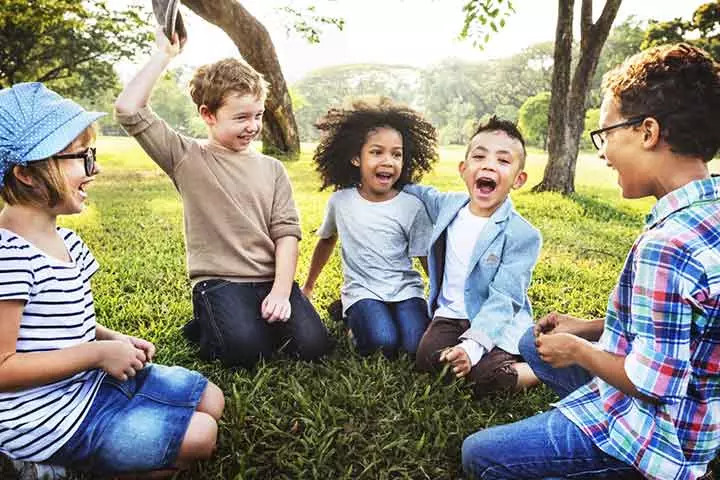
Image: Shutterstock
Rhyming Words game is a variation of Name the Animal. This word game for kids encourages your child to learn new words and helps hone their reasoning skills.
Age group: For ages 3 to 6 years
No of players: 2 or more
How to play:
- Name any animal.
- Ask your children to say the words that rhyme with the name of the animal, in turns.
- For example, when you say the word “dog,”your children should come up with words such as fog, hog, and log.
- Continue with a player until they run out of words and repeat the game with the next player.
6. Name, place, animal, thing
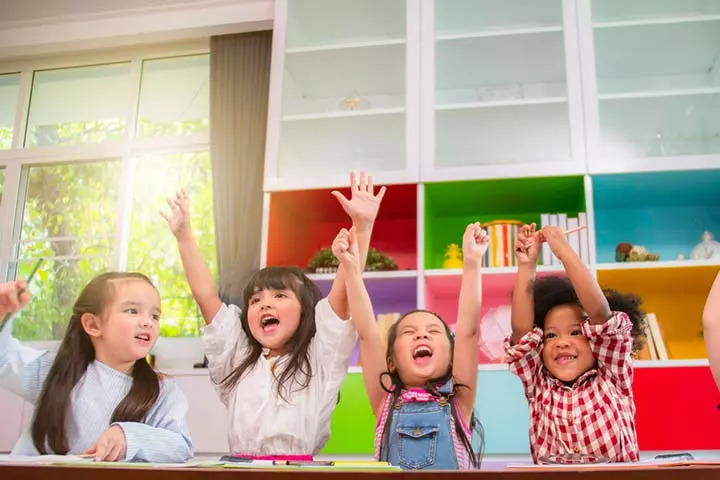
Image: IStock
You might remember playing this game as a child yourself. This game helps in expanding your child’s knowledge and memory.
Age group: 5 years and above
No of players: 2 or more
How to play:
- Give each player a sheet of paper and a pencil.
- Say a letter of the alphabet and start a timer.
- Each player must write the words of a name, place, animal, or a thing starting with that letter. For example, if the letter is A, a player may write, “Alex, Australia, Ape, Apple,” under each of these categories, respectively.
- You can assign different letters to different players or the same letter to each one.
- You can include other categories as per your convenience.
7. Hink pink
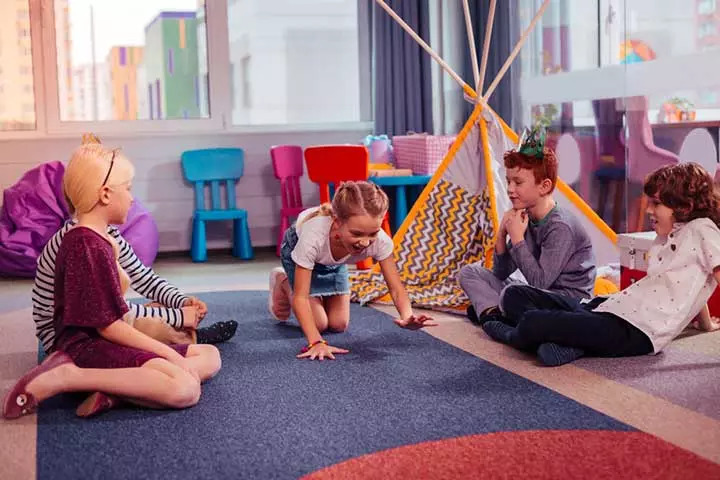
Image: Shutterstock
Children love this game. This word game for kids is designed to maximize fun while learning new words and their meanings. The game can help improve your child’s ability to solve crossword puzzles and cryptic crosswords.
Age group: 4 to 12 years
No of players: 2 or more
How to play:
- Ask each player to come up with a set of rhyming monosyllabic words, e.g., fat rat.
- Help them make a clue about their words. In this case, the clue will be “a rodent that is not thin.”
- Each player says their clue aloud, and the others try to guess what the rhyming words are.
- If the children are older, you can play Hinky Pinky (two-syllable words) or Hinketty Pinketty (three-syllable words). You can even make different combinations between different syllabic words.
- Ask the children to act out the words too so that all of you have lots of fun while the children learn difficult words.
- Here are some more words to get you started: Thin Pin, Big Pig, Tan Pan, Fan Man.
8. Guess the correct word
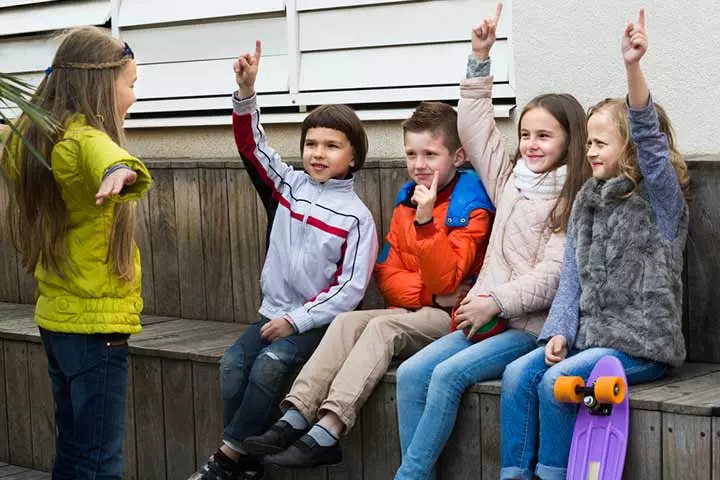
Image: Shutterstock
This word game for kids, if played mentally, is an excellent way to boost your child’s memory. It is a simple game and can be played with pencil and paper if you want to keep score.
Age group: 6 years and above
No of players: 2 or more
How to play:
- The first player thinks of a word and announces its first letter and the number of letters in the word to the others. If the player has thought of the word “Bananas,” they should say B and 6.
- The other players have to guess the word using these clues.
- If a player says another word but it has some matching words with the original word, the first player will say that the word is wrong but there are matching letters in the correct places or the wrong places.
- The next player uses these clues to make the next guess.
- You can keep the words simple or difficult according to the age of the children.
- As for the example of Bananas:
Player 2: Bullock
Player 1: That is incorrect
Player 3: Bahamas
Player 1: That is incorrect, but the As are in the correct place,
and so on.
9. Word hunting
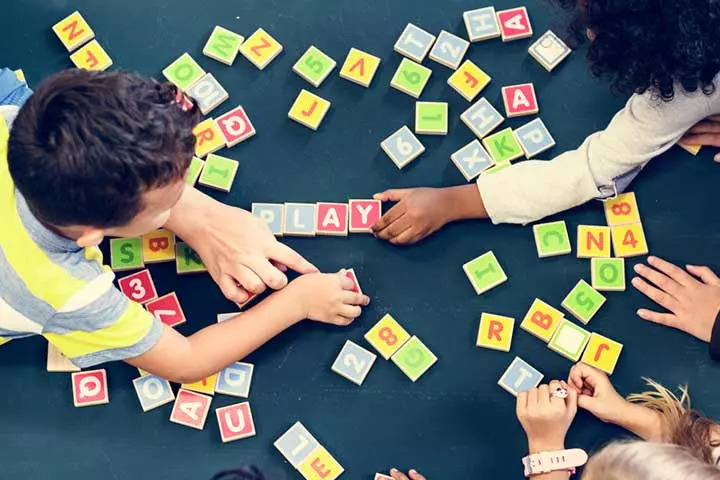
Image: Shutterstock
If your child is just learning the alphabet, this is an easy game to play. However, you can make some minor changes and tweak it for older children.
Age group: 4 to 7 years
No of players: 2 or more
How to play:
- Scatter magnetic letters, plastic letters, or letter blocks on a table.
- Ask your child to pick up a letter from the lot.
- For older children, you can write three- or four-letter words on little chits of paper and do the same procedure as above.
- For children who can read, you can ask them to pick words they see outside shops, etc.
10. Change one letter
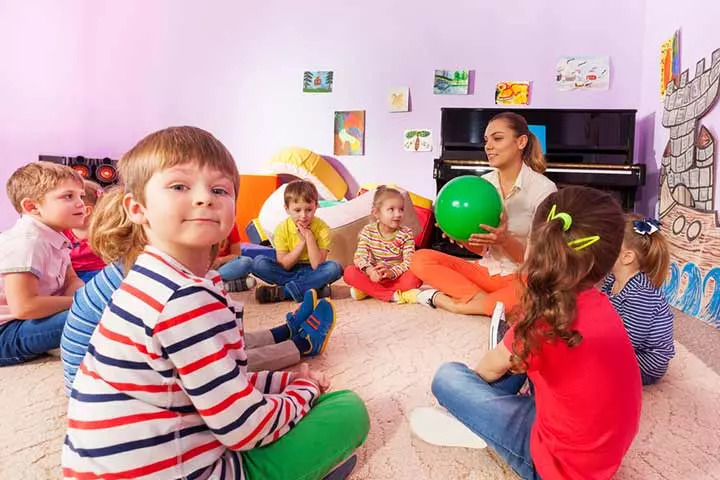
Image: Shutterstock
This is a great word game for school children. The game promotes out-of-the-box thinking and allows your child to come up with new words and even their meanings.
Age group: 5 to 10 years
No of players: 4 or more
How to play:
- Begin with a short word that has three, four, or five letters (according to the age of the children).
- Ask the children to take turns in calling out new words by changing just one letter of the previous word. E.g., park – part – dart – dark / mark – mare – mart / cart – care – case – cast – mast (and so on).
- You can set a timer or divide the players into teams to make the game more exciting.
11. Call my bluff
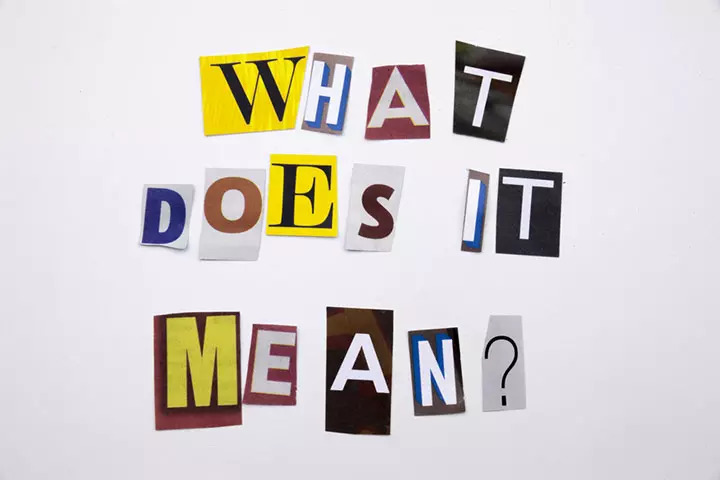
Image: Shutterstock
Call my bluff is commonly played at sleepovers and during picnics and is an excellent word game for older children.
Age group: 8 years and above
No of players: 4 or more
How to play:
- Divide the children into teams.
- Give them a set of words that are common but unfamiliar to them.
- Ask each team to look up the meaning of each word, and make up two wrong meanings for each word.
- Each team asks the other team the meaning of a word and gives them the three options.
- If the opposite team guesses the correct meaning, they get points. If they don’t, the team that asked the meaning gets the point.
- For example, let us take the word “Bewildered.” You can give three choices (a) to be left in the wild, (b) shocked or surprised, and (c) out-of-control behavior.
12. Unscramble the words
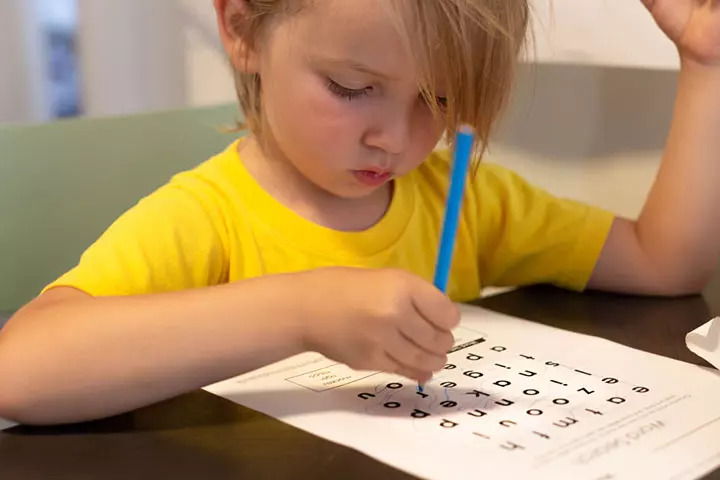
Image: Shutterstock
Let your children put on their thinking caps and play this game. The word game makes your child think and helps stir their imagination and improve their reasoning skills.
Age group: 5 years and above
No of players: 2 or more
How to play:
- Think of a word and write it down on paper but in a scrambled form.
- Your child has to think and arrange the word in the right sequence.
- You could even give clues so that they can unscramble the word faster.
- You could also write down a set of scrambled words, set the timer, and ask them to solve as many as they can within the allotted time.
13. Tell me a story
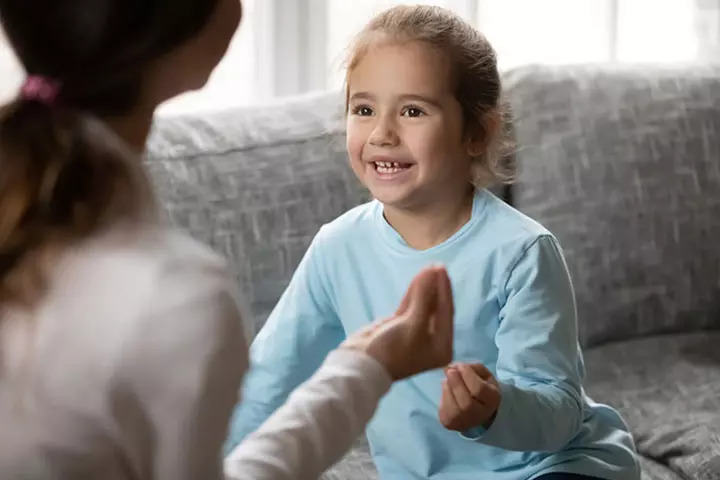
Image: Shutterstock
Children are incredibly imaginative. Children, as young as three years old, start making imaginary stories. You can play this game to fire your child’s imagination.
Age group: 5 years and above
No of players: 2 or more
How to play:
- Start a “story” with a sentence.
- The next player should say another sentence and continue the story.
- As the story grows, it becomes hilarious and absurd.
- For example, you start with the sentence, “In a village, there was a man named Joe.” The next player can say, “He wore a red shirt every day,” and the next player may say, “One day, a bull charged at him,” and so on.
14. Words in a word
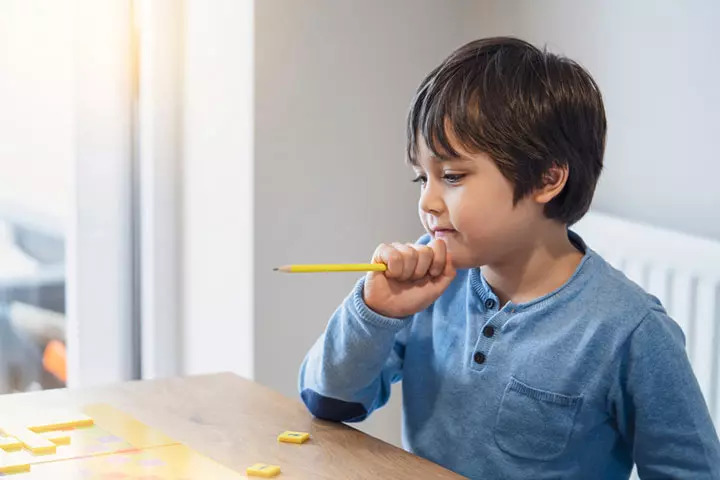
Image: Shutterstock
This is one of the most popular word games for kids and one of the best word-building games of all time. It is useful in improving your child’s English, if it is not your native language. You might have played this game in your childhood. It is now your children’s turn to play the game and keep the tradition alive.
Age group: 5 years and above
No of players: 2 or more
How to play:
- Think of a long word. A popular word choice for this game is “Constantinople.”
- Ask your child to write words starting with each letter in the word. They should use the letters contained in the word only.
- For example, Constantinople can have words such as con, cot, on, oil, no, nap, sit, and sip.
- You can set a timer and ask your child to write down as many words as they can within the given time frame.
15. I’m going on a picnic
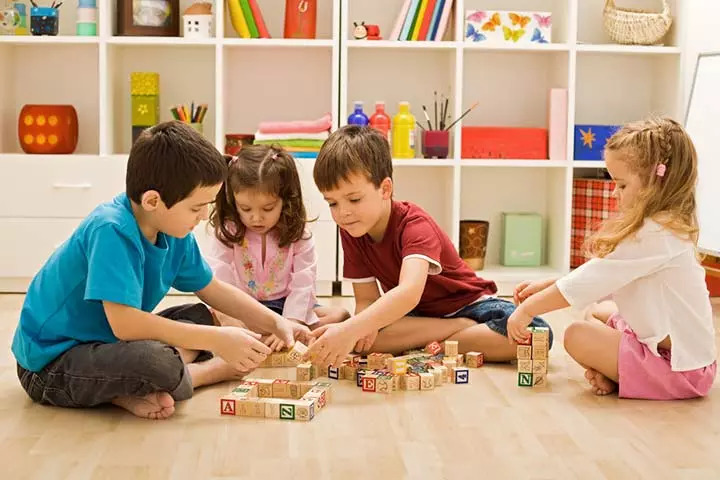
Image: Shutterstock
This game is for older children. It helps hone their creative skills and improves their memory. The word game is usually played in classrooms, but they can play it at a sleepover or even with you as a family game.
Age group: 5 years and above
No of players: 3 or more
How to play:
- The first player starts by saying, “I’m going on a picnic, and I will bring a ….”.
- The next player adds an item to the list and repeats the words.
- Each player has to repeat the items named in the exact sequence.
- If a player forgets a name or the sequence, they are out of the game.
- You can either start the game all over again or ask the next player to pick up the sequence and continue.
- For example, the game goes as follows:
Player 1: I’m going on a picnic, and I will bring a cookie.
Player 2: I’m going on a picnic, and I will bring a cookie and a Popsicle.
Player 3: I’m going on a picnic, and I will bring a cookie and a Popsicle and a bottle of juice, and so on.
16. Crosswords
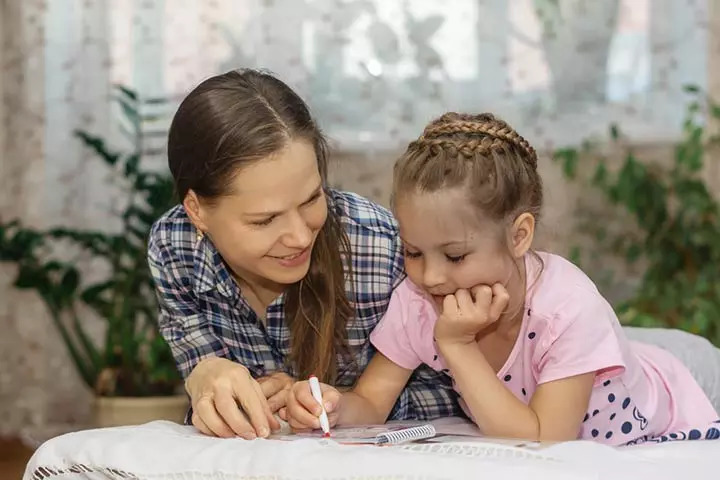
Image: Shutterstock
Solving crosswords requires practice and a lot of patience. The game will not only teach your children new words but also develop their deductive reasoning skills to a great degree.
Age group: 6 years and above
No of players: 1
How to play:
- Draw a grid with white and black squares and number each row and column.
- Then, write a set of clues at the bottom of the grid with the corresponding row or column number.
- Ask your child to solve the crossword.
- You can set a timer to make the game challenging.
- You can get some printable crosswords with clues easily on the Internet (you will find some free and printable crosswords in this link). Crosswords regularly appear in newspapers and magazines.
17. Word quest
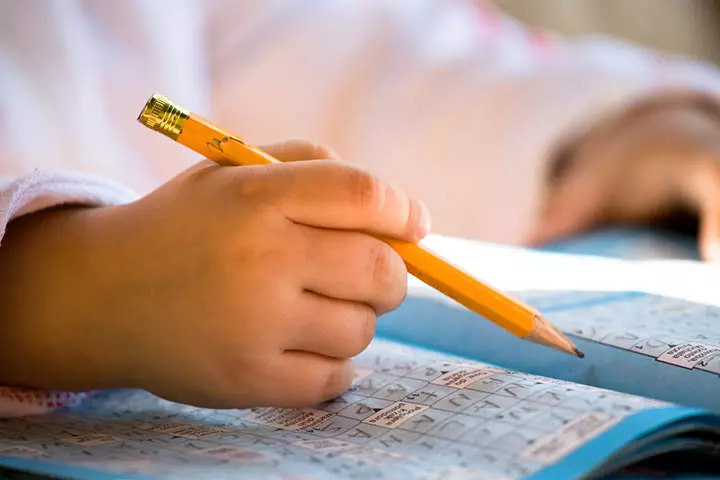
Image: IStock
Word quest is a word game for older kids. The game involves searching for words using single letters and makes your children use their deduction skills.
Age group: 5 years and above
No of players: 2 or more
How to play:
- Draw a 10×10 or 12×12 grid on a sheet of paper and divide it into squares.
- Write various words below and to the side of the grid.
- Write random letters in random squares.
- Ask your child to fill in the grid using the words you have written outside the grid.
18. Consequences

Image: Shutterstock
This word game helps stir the imagination and encourages creativity. The game works well with both children and adults.
Age group: 5 years and above
No of players: 2 or more
How to play:
- The first player writes down a sentence on a sheet of paper and passes it on to the next player.
- The next player writes the next sentence and passes it on.
- Once all the players are done with adding their sentences, you can read out the story.
- You can also write 4–5 sentences with open endings on a sheet of paper and hand them over to each player. Each player writes their version of the story and reads it aloud at the end of the game.
- For example, you can write, “There was a man named …….. He …………. a woman named ……………. They went to …………. He said, “…………………” She said, “……………………” And then, ……………..” and so on.
19. Scrabble
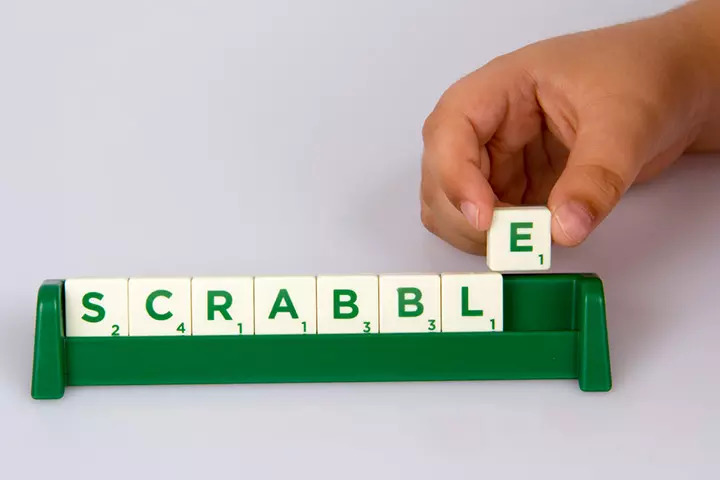
Image: IStock
Scrabble is a popular classic word game for kids. If you want your child to learn new words, this is one of the best games.
Age group: 6 years and above
No of players: 2 or more
How to play:
- Get a scrabble boards.
- Set it up and read the rules.
- The number on each letter tile tells you how many points it’s worth, and the squares on the board tell you how many points you scored.
- The player who gets the maximum score is the winner.
- After a game of Scrabble gets over, the board looks similar to a crossword.
20. Pass the bomb
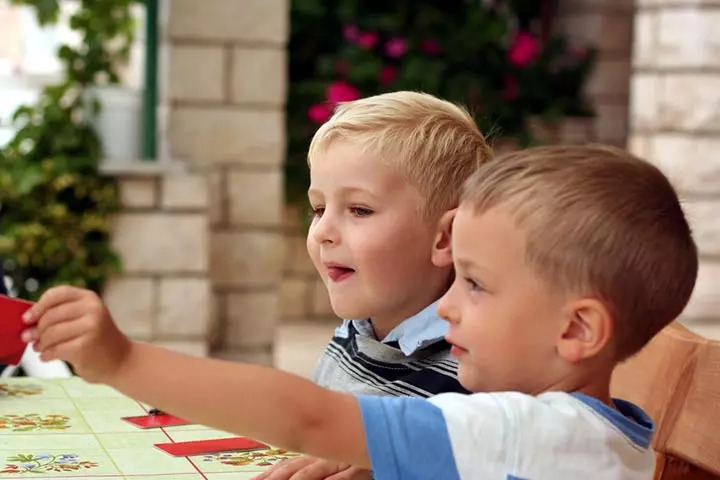
Image: Shutterstock
Pass the bomb is an educational game that will test your child’s alacrity. The first player should say a word and pass the bomb as quickly as possible to the next player, who must say a similar-sounding word. The players need to be quick in passing the bomb before it explodes. You can get this board game at a shop or simply make your own set.
Age group: 5 years and above
No of players: 2 or more
How to play:
- Take a set of card papers and write two- and three-letter words on them with a marker.
- The first player picks up a card and passes it around.
- The “bomb” goes off after a certain time. If you have made the cards at home, you can use a timer or even play music.
- The moment the timer goes off (or the music stops), the player holding the card is out.
- However, before leaving, they have to say a word that contains the word written on the card.
- For example, if the card has “ART” written on it, the child who gets out can say a word with ART in it, such as part, mart, or cart.
1. How can word games help children improve their spelling skills?
When children engage in word games, they are required to focus on the spelling of various words, which helps them to learn and remember the correct spelling of those words.
2. In what ways can word games help children with their grammar?
Word games encourage children to think about language playfully and engagingly, making it easier to understand and remember grammar rules. Word games can also help expand children’s vocabulary, an essential component of good grammar. By learning new words and their meanings, children can improve their ability to express themselves clearly and accurately.
3. How can word games help children improve their vocabulary?
Word games are an excellent way to improve children’s vocabulary skills, as they help them learn new words and reinforce their understanding of familiar ones. Games such as Scrabble, Boggle, and crossword puzzles challenge children to think critically and creatively about words, requiring them to use problem-solving skills to develop new words and find hidden ones.
4. How can word games help children become better readers?
Word games can help children become better readers by improving their vocabulary, spelling, and comprehension skills. Such games require children to identify and create words, helping them to recognize new words and understand their meanings. This eventually improves their reading skills.
When education is imparted as activities and games, children tend to grasp it much faster and retain it longer. So, if you want your children to have great communication skills, fluent vocabulary, and fascinating imagination, involve them in word games for kids. Games, such as I spy, make a word, or hink pink, are effective in keeping children engaged and sharpening their grammar and vocabulary. Another good thing about these games is that you can be involved in playing too. So, choose a suitable word game according to your child’s age and have fun while playing.
Key Pointers
- Word games stimulate the brain to improve reasoning skills, vocabulary, and language skills.
- Spur creativity through games such as I spy, rhyming words, and hink pink.
- Test the memory with games such as guess the correct word and make a word.
Was this article helpful?
The following two tabs change content below.
- Reviewer
- Author
Teaching children to read is perhaps the single most important job we have as elementary school teachers. Reading is the foundation for everything! There have been a lot of theories and much debate about the best strategies for teaching reading. I’ve spent a lot of time studying literacy—enough to know that how I used to teach reading wasn’t great. I emphasized memorization way too much and didn’t spend enough time giving students phonics strategies they could apply to unfamiliar words.
Research into the science of reading has given us a lot of insights into how the brain works when learning how to read. We now know that most children need explicit instruction in phonics and phonemic awareness to make connections between how a word looks and how it sounds.
Knowing about the science of reading is the first step for teachers to become better at teaching literacy. The next step is knowing how to make it fun and enticing for kids! In my classroom, we talk a lot about “playing with words.” Word study time isn’t about rote memorization, it’s about exploring words with curiosity.
I personally love the Orton Gillingham approach. It was developed specifically to help students with learning challenges such as dyslexia, but it also works well with any young learner. It’s a multisensory approach to reading, using visual, auditory, and kinesthetic strategies. The idea is to give students multiple ways to interact with (and play!) with words. It’s an evidence and science-based way to teach reading that really works!
Here are my favorite strategies for making word study fun, using concepts based on the science of reading and the Orton Gillingham approach:
Word Sorts of All Shapes & Sizes
There are so many ways you can use word sort activities when teaching students how to read. Word sorts push students to use higher-order thinking skills as they look for similarities and differences in the features of each word.
There are so many ways you can use word sort activities when teaching students how to read. Word sorts push students to use higher-order thinking skills as they look for similarities and differences in the features of each word.
The best part about word sorts is that you can easily tweak the activities to suit your particular students’ needs and interests.
- For your visual learners, add color-coding or highlighting to the word sort activity.
- Are your students competitive? Race against a partner or see if they can beat their own time by completing a timed word sort.
- Even more motivating? Have them beat the teacher by finding mistakes that you’ve purposefully made. Kids love pointing out their teacher’s mistakes!
- Get kids up and moving by doing a word sort gallery walk. Tape up words around the room and have students travel with their notebooks, recording the words in their correct categories.
- Integrate technology with digital word sort activities.
Try several different styles of word sorts to see what works best with your students.
Trash It! Which Word is Nonsense?
My students always love this fun twist to phonics. Present your students with a word list that includes a handful of words with specific spelling patterns. Three of the words follow the spelling pattern you’re currently studying, and one does not! Students have to use higher-order thinking skills to identify the one word that doesn’t belong. The digital version I created has students actually dragging the mismatched word into trash cans. Check out the Digital Word Work for Grades 1-5 here.
Word Riddles
I include word riddles with each of my Digital Word Work bundles. This requires more advanced proficiency in phonemic awareness. Students read the riddle and then choose which word from the given list solves the puzzle. My clues focus on various phonemes, patterns, and syllabication. Here’s an example of a slide from third grade:
Word Work Dice Games
There are tons of different games you can play with dice during word study time. Some ideas include:
- Rainbow roll & write: students write their words based on the color they roll
- Roll & spell: students roll the dice to choose beginning, medial, and ending letters/sounds. After they have the full word written out, they have to decide if they wrote a real or a nonsense word.
Hands-On Word Play
I love changing things up by introducing activities using hands-on materials. Some ideas include:
- Molding words out of play-doh
- Tracing words in a sand tray or sensory bin
- Forming letters with wikki stix
- Stamping letters
- Forming words with alphabet magnets, cookie cutters, or blocks
- Build words using clothespins labeled with each letter
These types of activities certainly help your kinesthetic learners, but they can also be a lot of fun! Most importantly, it slows students down and allows them to analyze words letter-by-letter, sound-by-sound.
If you don’t have the supplies needed to try those suggestions, I also have Hands-On Word Work bundles for grades 1-3, which involve cutting, pasting, and sorting.
Word Work Tic-Tac-Toe
Students are always more motivated when they are given autonomy to make choices about their learning. With a tic-tac-toe board, students can choose any three Word Work activities they want, as long as they can get three in a row. Some options may include:
- Sort words by what they have in common, and let them find the commonality on their own (same medial sound, same digraph, etc.)
- Change one sound in a word to make a new word
- Write three rhyming words each
- Write a complete sentence for each word
I think the key to making word study fun is to offer your students a variety of options that appeal to all learning types.
Ready to try some new word study activities without spending hours creating your own materials? Check out my Digital Word Work Bundles, customized for each grade level:
First Grade
Second Grade
Third Grade
Fourth Grade
Fifth Grade
Do you have any favorite word study activities that haven’t been mentioned yet? Let me know in the comments!
Teaching vocabulary to preschoolers is not just about giving the definitions and some examples, but about creativity and fun techniques to practice the words with them. One of the best and practical ways to teach them vocabulary is using games. Here are some of them.
Categories
This game helps children to categorize the words in the columns, to get their meanings and to find a relationship between these words. For each category, you can use flashcards (fruit, vegetables, clothes, sports, etc) and give a list of different words to your kids (banana, skirt, apple, tomato, tennis, baseball, shirt, shorts, kiwi, etc.).

out the odd word
This game is a bit similar to the previous one because it is again related to categorizing. Here the teacher gives a list of words, asking kids to cross out one odd word from each line. For example:
- November, July, September, October
- Cold, snow, January, summer
- Monkey, banana, apple, kiwi
- Run, tennis, baseball, football
- Taxi, car, bus, house
How many?
Here all you need is to show a picture of different things (animals, fruit, vegetables) and to ask your younger learners to count how many things there are in the picture.
2-litre jar
This is a fun game to play with your kids. You show them a 2-litre jar and ask to come up with words that can be placed in this jar. For example, they can say coffee, candle, but they cannot say happiness or animal, because they cannot be placed in this jar.
I spy
One might call this game an old one, but my younger learners adore it. To begin the game choose an object and give some hints to your kids, such as: “I spy something that is big and blue”. The pupil that guesses the word takes a turn to spy something and let other kids guess.
Apple Pass
Get your kids to sit in a circle. You can use a real apple or a fake one. While you pass the apple to the next student, you must say one English word. The student then throws to another student and says a different English word. The student who fails to catch the apple or to say a word is out. And the game continues until you have one winner. It can be played with different categories, such as fruit, vegetables, animals, etc.
Touch
This game is all about giving some instructions. The teacher says: “Touch the board”, “Touch the chair”, “Touch something black”, etc. And young learners go around the classroom to find the appropriate objects and to touch them.
Basketball
Make a paper ball and prepare a box where your kids can throw an imaginary ball. Show a flashcard to the first student. If they say the right word and throw the ball into the box, they get two points. But if they fail to do one of these things, they get just one point. The person who gets the most points is the winner.
Pictionary
This is a nice activity for recycling vocabulary. You can play this game in groups. Tell one of the students a word and ask him/her to draw a picture of it on the board. The first student to guess, what the picture is, gets a point and takes a turn to come up to the board and to draw the next picture.
Line True or False
Put a line of tape on the floor and make appropriate signs for «True» and «False». Show a flashcard and say its word (you can say a wrong word). If students think that you have said the correct word they jump on to the True side, if not they jump on to the False side. The student who gives the wrong answer is out.
What games do you play with your preschoolers?
Instructions, curriculum, and tips for teaching a word study program to young children in the classroom. Includes free morning message ideas for teachers.

In my first grade classroom, I’ve used a combination of strategies, programs, and activities throughout the year to teach my students phonics, words, and spelling in order to learn to read and write. Most years, I usually teach a grade 1/2 combined class so that means a lot of differentiation is needed to meet the needs of all my learners. This post will explain how I go about teaching a word study program.
I am a firm believer in a balanced literacy approach where I adapt my instruction every day to meet the needs of my learners in order for them to develop reading and writing skills. That being said, my program is not completely phonics-based. I incorporate a balance of phonics (word families, vowels), sight word instruction, as well as spelling and word study.
I will explain a few of the key components of my program today.
Sight Words: Why are SIGHT WORDS important?
I am a firm believer in a language arts program that teaches and reviews sight words. Sight words are those words that have a high-frequency presence in printed materials that children read. As children build their sight word recognition, they are able to read more books.

I have seen how beneficial it is to my early readers once they have learned new sight words. Their confidence goes way up, they enjoy reading books, and they feel successful!
Word Families: Why are WORD FAMILIES important?
Word families are chunks or patterns within words that rhyme. They provide predictable patterns to help emergent readers understand our language. Once students understand the 37 most common word families in English, they are able to decode 500 words!

I teach the patterns in word families throughout the year because they help my students develop their decoding and ability to sound out words. Once they learn those word families, they are able to decode so many words quickly. This puts them well on their way to reading and decoding success!
Spelling: Why is a SPELLING program important?
I use a spelling program in my classroom so every student has a list of words to learn and practice at home. My spelling program is mostly phonics based and each unit I teach reviews the short and long vowels, digraphs and diphthongs, blends, and more.

Here is the chart I use in my classroom to keep things organized. It has my spelling words, sight words, and word families for the week all in one place.
I use each week to review the phonetic concept that is present in that spelling unit. My students develop not only the ability to spell words but read and understand a new phonetic pattern or rule. They can then use those skills to read new material and write independently.
Daily Five
Word study and phonics lessons and activities occur frequently during our week. I usually have a designated time of the week to work on spelling, sight words, and word families. This coming year I plan on incorporating the Daily 5 system of word work, where my students will be working on something every day. With the Daily 5 system, you need to organize your literacy blocks throughout the day, instead of the whole class working on the same activities at the same time.
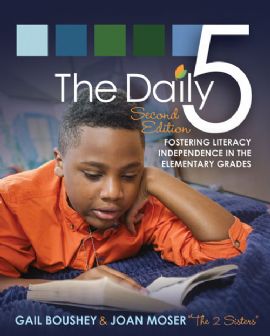
During this time, I pull small groups to work on word study concepts, while my students are completing their word work activities.
Morning Meetings
Morning meetings are a very important part of every day in my classroom. I use morning meetings to review and introduce new word study concepts.
Activities Completed Each Morning:
1. Introduce or review spelling words for the week.
I have the words posted in a chart and we review these words in different ways each day.
2. Complete our morning message.
I change the type of message every day. I write them related to what we are doing during the day or our current themes. Sometimes I leave words out, letters out, or vowels or consonants out for students to figure out and fill in as a class.

Here is an example of a morning message where I have left out consonants for students to figure out and fill in.
3. Work with word families and practice phonics skills.
We complete different activities each day to mix things up and reach all learners and styles. Some of the activities I like us to do together is brainstorm words that rhyme, fill-in sentences with words missing, and come up with sentences using the short or long vowel pattern we are practicing that week.
If you are interested in a copy of my morning meeting schedule for the week to use for teaching a word study program, click HERE to download!

Word Study Curriculum
I have created a sight word program called Learning to Read & Spell with Sight Words. I have created a resource to use when teaching each of the Dolch words lists: Pre-Primer, Primer, First Grade, and Second Grade. You can see how I run my sight word program using this program HERE.
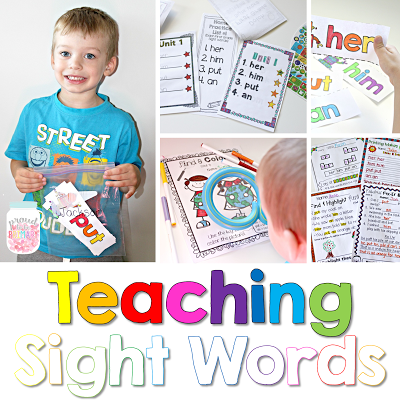
I have used this complete curriculum in my classroom with great success. It has allowed me to differentiate for all my learners in a kindergarten, first, and second grade combined classrooms. It is sequential and we are able to continue at the end of one list (pack) and move on to the next list (pack) and materials after. The activities are the same, with a few variations and levels of difficulty.
Sight Word Resources
If you are thinking of purchasing the curriculum and want to see a sample, you can grab this FREE unit HERE which includes a week’s worth of materials and activities for your classroom.

To see the Learning to Read & Spell with Sight Words curriculum, click HERE.




Grab the complete curriculum in a giant BUNDLE HERE.

Phonics Resources
To teach phonics and rhyming word families, I have created a phonics program called Phonics are Fun. I have created a resource to use when teaching each of the short vowels. Check out how I teach word families using this program HERE.

I am excited to use this curriculum because it is comprehensive and I have all the materials I need in one place. I am able to differentiate for all my learners and have multiple activities at different times of the day.
To see the Phonics are Fun short vowel units, click the image below.

Grab the Phonics are Fun BUNDLE featuring 5 short vowel packs with materials to teach 19 word families at a discount.

What are the key components of your word study program?
More Ideas for Teaching

Learning Sight Words

Teaching Sight Words

Sight Word Books for Kids
PIN

Inside: 5 great, educational word study games online for school age kids to play in or out of school.
Technology makes it possible for our students to easily practice vocabulary, phonics and spelling online and there are some great online word study games available for students of all ages to explore. Today I’m sharing five of the best learning websites for kids that focus on literacy learning. The sites on this list make the cut because they each score well against the following criteria;
- The games are educational and they encourage kids to think
- The games are engaging, with good quality graphics
- The games are free to play
- They sites offer games for school aged children, across a variety of grade levels – from emerging readers to upper elementary grade levels
These websites are great for use at home – for fun or as homework support, and at school. Each site description below includes some details on how the individual site might work best for parents and/or teachers.
5 Best Educational Word Study Games Online for Kids
Kids Spell
Choose from thousands of pre-made spelling lists or create your own to use with your kids. Lists are divided by grade and reading level (beginner, intermediate, and advanced). There are games to review everything from grade one phonetic sounds to compound words and homophones for more advanced readers and spellers.
Games have cartoonish animals and characters like “Farkle Frog” and “Spellasaurus”. The games are so much fun that your kids won’t even notice that they’re improving their spelling and comprehension with every click.
These games are great to use with stations in the classroom or to review as homework or with intervention or differentiated groups.
Spelling Bees
This multiplayer game lets kids spell words read by a computer-generated voice and place the letter in the beehives. They’ll have so much fun racing to the finish as they see the colorful bees plant the letters as the hives grow with correctly spelled words.
Students may play against other online players, but there is not a communication or chat platform. A fun classroom activity or review for homework, Spelling Bees is buzzing with learning and fun!
Words with Friends Edu
The popular online game gets off social media and on a safe and secure platform to allow students to practice spelling and developing academic words. Special categories include power words from assessments, textbooks, and selected readings. They also receive bonuses for word usage. Kids can make their own avatars and earn badges. Students can only play with their own classmates, so it’s a safe alternative to the open Words with Friends.
Merriam-Webster Vocabulary Challenge
Upper elementary and high ability learners will love to challenge themselves with a 10 question vocabulary quiz from the dictionary giants. Students should keep playing to test their abilities on a variety of vocabulary words. Other popular quizzes on the site include commonly misspelled words and “Name That Thing” visual vocabulary quizzes.
Take it further and set up a challenge group. Have your kids set goals and jot down new vocabulary words to practice and explore. There’s no need to logon to the site, so it can be used anywhere with no safety concerns.
Turtle Diary
Has hundreds of games for up to fifth grade. The language games have a lot of options for word study, including Hangman, Word Scrabble, Synonym Dominoes.
Games reviewing homonyms (words that are spelled the same but have different meaning) and homophones (words that sound the same but have different meaning and spellings) will help your readers develop their vocabulary and work on spelling.
Related: Vocabulary and Word Work Apps for Kids Aged 9+
Learning and reviewing concepts involving vocabulary, spelling, and phonics are always more fun when your students can play games! Students love using devices in the classroom and home. These online word study games will have your students improving their reading and writing skills while having a blast. Try a few out in your home or classroom!
Click on the images below for more great online or screen based educational resources;

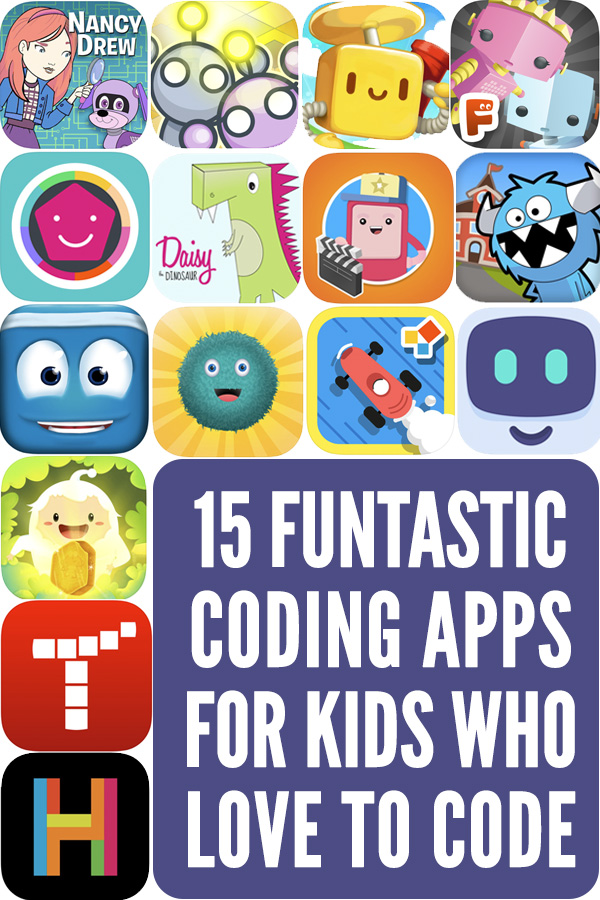
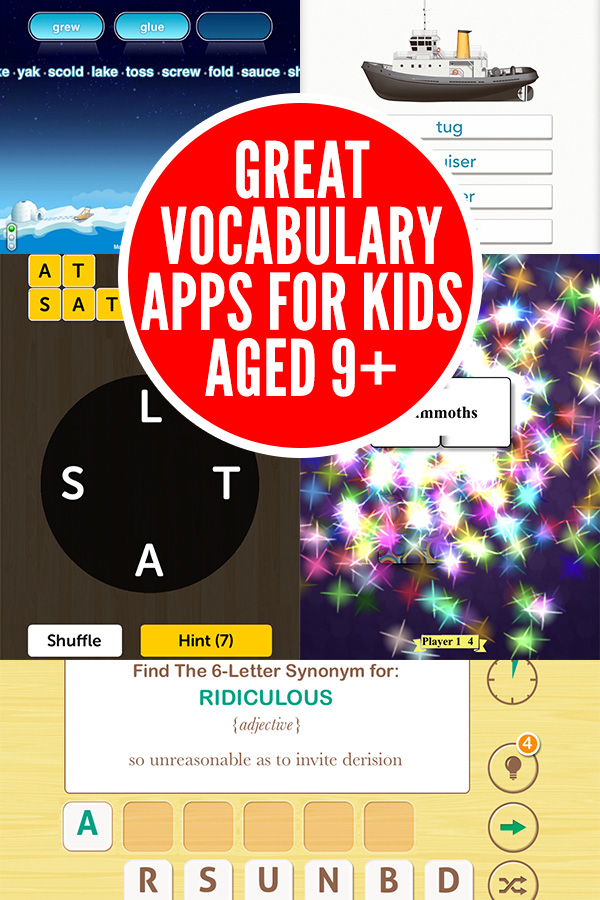
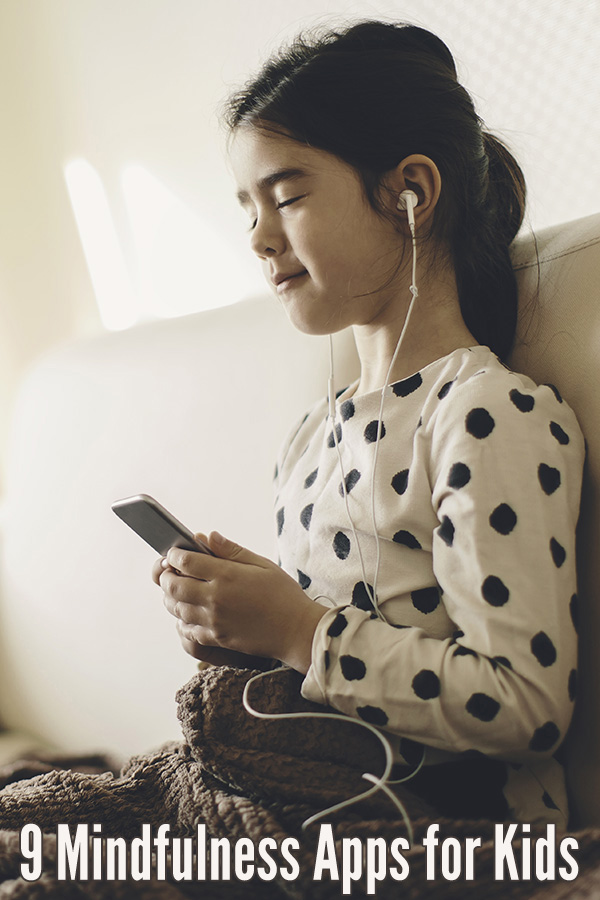
Christie Burnett is a teacher, presenter, writer and the mother of two. She created Childhood 101 as a place for teachers and parents to access engaging, high quality learning ideas.

